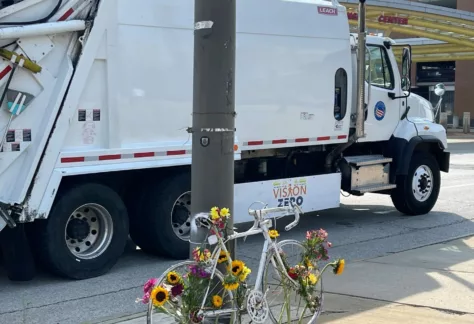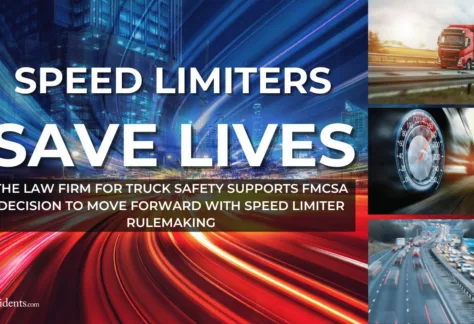On June 4th, Chairs Defazio, Norton, and Payne introduced the INVEST in America Act, a five-year surface transportation funding bill. INVEST stands for “Investing in a New Vision for the Environment and Surface Transportation in America Act.” Click here to read the text of the bill. The 2021 INVEST in America Act Fact Sheet demonstrates that roadway safety programs receive a “significant boost.”

Of particular interest to The Law Firm for Truck Safety LLP are the following ten (10) truck safety initiatives:
- Restoring public access to Compliance, Safety, Accountability (CSA) data on the Federal Motor Carrier Safety Administration’s (FMCSA’s) website (Sec. 4202). Publicly available safety data is crucial to improve shipper, receiver, broker, and customer hiring decisions and standards to ensure a safe supply chain. Click here to watch a video about the importance of avoiding hiring one of the 10% of unsafe motor carriers that cause nearly half of all recordable crashes. The bill also directs the U.S. Secretary of Transportation to revise the methodology to prioritize motor carriers for safety intervention
- Preventing further delays for the entry-level driver training (Sec. 4303). This section requires a progress report to Congress to fully implement the FMCSA’s Entry Level Driver Training (ELDT) rule. This rule will set a baseline for training requirements ensuring safer entry-level truck drivers on our roadways. Two of the attorneys in our law firm regularly teach as guest faculty at the Great Lakes Truck Driving School in Columbia Station, Ohio. To date, over 150 truck driving students have been taught by our lawyers.
- Studying driver detention time by collecting data to be published and integrated into rulemaking to establish time limits on the length of time that a truck may be reasonably detained by a shipper or receiver for loading or unloading (Sec. 4304). Truck drivers have a lot of responsibility driving a large, heavy truck. As such, they are regulated on when and how long they may drive to ensure that they stay awake and alert while driving. A well-timed and safe schedule can become unsafe when a shipper or receiver needlessly delays the loading or unloading of a truck. This study and eventual regulatory mandate will require shippers and receivers to load and unload trucks in a reasonable timeframe to help truck companies and truck drivers properly plan routes to allow for adequate rest and home time. This section of the bill will hopefully improve the quality of life for a truck driver so that schedules are not upset by unnecessary delays at a loading dock.
- Establish a Truck Leasing Task Force to avoid abuses on truck driver pay (Sec. 4305). There are three (3) types of truck drivers: company drivers paid to drive a company truck; owner-operators who own a truck and are “leased-on” to a motor carrier’s authority; and “lease purchase” programs. The “lease purchase” programs result in unfair pay to the truck driver because the money earned is poured into the lease of the equipment and not actual compensation for the driver. Truck drivers often unknowingly sign bad lease arrangements that result in below minimum-wage take-home pay because the bulk of the driver’s earnings go toward paying for the equipment they are driving. Predatory truck companies use “lease purchase” programs as an incentive to make money on cheap labor and avoid paying for their own purchase of equipment. Hopefully, this task force will bring to light abuses that take advantage of unsuspecting entry-level truck drivers.
- Establish guidance with respect to the use of a commercial motor vehicle for personal conveyance (Sec. 4306). The bill requires the FMCSA to review the hours-of-service time limits for when and how long a truck driver is able to drive a truck, particularly when the driver is moving a commercial motor vehicle for personal use while off-duty. Personal conveyance does not reduce a truck driver’s or truck company’s responsibility to drive safely. This bill directs the FMCSA to revise the guidance to establish specific mileage or time limits on when a truck is used for off-duty personal use.
- Screening for obstructive sleep apnea is mandated by the bill directing the FMCSA to assess the risks posed by untreated sleep apnea and to initiate rule making to establish screening criteria for truck drivers (Sec. 4308). The agency’s Motor Carrier Safety Advisory Committee (MCSAC) and the Medical Review Board (MRB) issued a “Final Report” nearly ten years ago creating an Obstructive Sleep Apnea Subcommittee to work on this issue. Hopefully, rule making will be forthcoming to help incorporate early screening and detection of sleep apnea to help prevent fatigued truck driving.
- Making automatic emergency braking (AEB) standard for newly manufactured heavy-duty Class 7 and Class 8 commercial motor vehicles (Sec. 4404). Class 7 and Class 8 heavy-duty trucks already have mandated Electronic Stability Control (ESC)Electronic Stability Control (ESC) systems are designed to reduce untripped rollovers and mitigate severe understeer or oversteer conditions that lead to loss of control by using automatic computer-controlled braking and reducing engine torque output., which is the platform that automatic emergency braking is tied into and allows for standardization without additional research. Several safety groups have expressed concern that the bill does not yet mandate AEB on medium-duty trucks. Unfortunately, there is no ESC mandate yet on medium-duty trucks which complicate the potential standardization of AEB in situations where a medium-duty truck is pulling a trailer or has different chassis, axle, and brake configurations. Imagine a medium-duty dump truck towing a pintle-hook trailer with a bobcat skid-steer loader. AEB could potentially cause a jack-knife scenario of the trailer being towed because the trailer is not integrated into an already established ESC system. Fortunately, the bill mandates additional research for AEB involving medium-duty commercial vehicles eventually leading to universal AEB for all commercial motor vehicles.
- Improving rear underride guards and a study on the benefits of side underride guards (Sec. 4405). The bill directs rule making to improve rear guards to meet already existing standards and to conduct research on the design and development of rear impact guards to prevent underride crashes at higher speeds. Regulations are to be amended to also include rear impact guards as part of already existing minimum periodic inspections. Our law firm previously provided a public comment to the notice of proposed rule making in support of the annual inspection requirement. Additionally, the U.S. Secretary of Transportation will be required to complete additional research on side underride guards, and if warranted, develop performance standards mandating them. Please click here for additional information and resources about stopping catastrophic underride crashes.
- Updating the required amount of insurance for commercial motor vehicles for large trucks from a $750,000.00 minimum to a $2,000,000.00 minimum with the new amount adjusted for inflation by the FMCSA every five years (Sec. 4408). Updating the minimum insurance required for commercial vehicles is important because the $750,000.00 minimum was set in 1980 and has not changed since. Updating the minimum will make sure at-fault drivers are held accountable, roads are safer, and injured people receive the care they need. In a multiple-fatality crash, the $750,000.00 is divided among the surviving family members resulting in below minimum compensation for the value of each statistical life. Truck driver’s also benefit from an increase in insurance minimums because the primary threat to a truck driver’s life on the road is an unsafe or negligent truck driver. Increasing insurance minimums will protect the truck driver and his or her family because the limits from 1980 are truly not enough to protect those catastrophically killed or injured in a truck crash. Increasing insurance minimums will also protect the taxpayer. In the 8-figure type catastrophic scenario, someone has to pick up the medical costs for anything beyond the insurance minimums.
- $1 billion funding for new infrastructure to address the shortage of truck parking was also added to the bill under Title I – Federal-Aid Highways, Subtitle C – Project-Level Investments (Sec. 1308). A grant program of $1 billion over the life of the bill will allow states to add needed truck parking for trucks. As the number of trucks on the highway have increased, the number of safe parking places has not increased at the same rate. Truck drivers need a safe place to park so drivers can take required time off to gain adequate rest. Without safe parking, trucks end up on side roads, public parking lots without adequate amenities, on and off ramps, and other unsafe locations creating hazards for other motorists. This desperately needed infrastructure improvement will allow for safe parking and well-rested drivers.
Unfortunately, Speed Limiters were not added as part of this bill.
Our law firm is disappointed and disagree with special interest groups who have lobbied to take this life saving requirement out of this bill. Speed limiters are an older, cost-effective, and simple technology to limit semi-trucks speeding on our roadways. Since truck drivers are typically paid by the mile, there is a strong incentive to drive too fast. High speeds are a significant contributing factor to high fatality rates on our nation’s roads. Prior rulemaking that has stalled estimated that limiting truck speeds will prevent 1,115 fatal truck crashes annually. Most larger truck companies have already figured out that a speed limited truck at lower speed also saves on fuel costs improving a truck company’s profitability and safety.
Referrals & Co-Counsel
Involved in a Crash?
No other law firm knows trucks quite like us. Our trucking law expertise and trial experience allow us to win multi-million-dollar results year after year.
Our team of truck accident attorneys works tirelessly to help your family find justice in the wake of a catastrophic truck crash.
Referrals & Co-Counsel
No other law firm knows trucks quite like us. Our trucking law expertise and trial experience allow us to win multi-million-dollar results year after year.
Involved in a Crash?
Our team of truck accident attorneys works tirelessly to help your family find justice in the wake of a catastrophic truck crash.
Please contact your lawmaker.
At the time of this news publication, several amendments were proposed to remove the provisions for minimum insurance, side guards, automatic emergency braking, and rulemaking for screening obstructive sleep apnea. If you are reading this, please contact your lawmakers to vote in favor of the bill and vote against any amendments to eliminate the pending safety provisions that are designed to save countless lives.
by Andy Young



